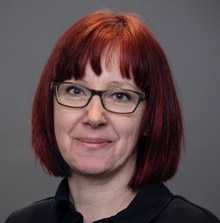Drug Discovery for Nontuberculous Mycobacterial Diseases
Discovering targets and screening small molecules to treat mycobacterial infections
Technology Overview
Mycobacteria are best known for causing tuberculosis. However, the nontuberculous mycobacteria (NTM), particularly Mycobacterium avium and Mycobacterium abscessus, also cause lung disease. NTM infections can be particularly serious in people with underlying conditions such as cystic fibrosis, chronic obstructive pulmonary disease, or bronchiectasis, which is permanent enlargement of parts of the lung.
 Dr. Tanya Parish
Dr. Tanya Parish
The prevalence of NTM infections is increasing 3% per year worldwide, including among people without other respiratory conditions. Therefore, drugs against NTM have commercial potential, although the pipeline for these drugs is not well developed. Currently, NTM infections are treated with a combination of antibiotics that must be taken for months or years. These drug regimens are ineffective, with cure rates under 60%, and can cause serious side effects.
Challenges to developing new drugs, include the bacterium’s inherent resistance due to a waxy cell wall and efflux pumps that remove drugs and enzymes that modify them. Similar to the mycobacterium that causes tuberculosis, NTMs can survive within lung macrophages or necrotic structures in the lung.
Dr. Parish has decades of experience working with mycobacteria. Her lab has the biosafety facilities and the expertise to culture these pathogenic bacteria for drug discovery and optimization. Her group developed a high-throughput, multiassay platform that is validated for discovering and optimizing new small molecule drugs for mycobacteria. The drug discovery platform includes multi-well growth assays and cytotoxicity screens and tests that measure the ability of compounds to inhibit infection of human macrophages. The Parish group has developed a novel assay to test compounds for bactericidal activity against nonreplicating M. abscessus.
The Parish group capabilities include medicinal and synthetic chemistry for compound modification and lead optimization. The team can also develop probes and affinity labels for binding and affinity assays. They can identify drug targets and mechanisms using overexpression libraries or through isolation and sequencing of resistant mutants.
Dr. Parish is interested in partnerships that lead to discovery and validation of new mycobacterial targets and drugs and optimization of candidate compounds. Her group can also test and optimize compounds under contract, using their customizable multiassay platform.
Stage of Development
- Preclinical in vitro
Partnering Opportunities
- Sponsored research agreement
- Collaborative research opportunity
- Consultation agreement
- High-throughput screening
- Small business collaboration
Publications
- McGuffin S, Mullen S, Early J, Parish T. Development of a series of high-throughput screens to identify leads for nontuberculous mycobacteria drug design. Open Forum Infectious Diseases. 2019. Supplement(6); S485.
- Berube BJ, Castro L, Russell D, Ovechkina Y, Parish T. Novel screen to assess bactericidal activity of compounds against non-replicating Mycobacterium abscessus. Front Microbiol. 2018. 9:2417. doi: 10.3389/fmicb.2018.02417.
Learn More
To learn more about partnering with Seattle Children’s Research Institute on this or other projects, email the Office of Science-Industry Partnerships.